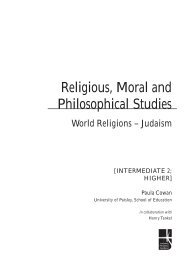Bertolt Brecht - Education Scotland
Bertolt Brecht - Education Scotland
Bertolt Brecht - Education Scotland
Create successful ePaper yourself
Turn your PDF publications into a flip-book with our unique Google optimized e-Paper software.
28<br />
CRITICAL STUDIES<br />
Delgado, M M, and Heritage, P (eds.), In Contact with the Gods?: Directors<br />
talk Theatre, Manchester: Manchester University Press, 1996<br />
A series of interesting essays from around the world. From <strong>Brecht</strong> admirers<br />
like Augusto Boal to others less enamoured like Jorge Lavelli. Lavelli is a Parisbased<br />
Argentinian who does not so much dislike the work or ideas of <strong>Brecht</strong><br />
as the rigid icon he became; he also disapproves of what he perceives to be<br />
the shackling of artistic freedom endemic in the <strong>Brecht</strong> heritage. The Italian<br />
director Giorgio Strehler also writes a great deal of sense about <strong>Brecht</strong>’s<br />
political persuasion.<br />
Demetz, P (ed.), <strong>Brecht</strong>: A collection of critical essays, Englewood Cliffs,<br />
USA: Prentice-Hall, 1962<br />
A difficult book to purchase today, but so old that it is usually available in<br />
libraries.<br />
A selection of essays on theory, several plays (e.g. Caucasian Chalk Circle, The<br />
Life of Galileo, Mother Courage and Her Children, Saint Joan of the<br />
Stockyards), music and language.<br />
However, the highlight of the book has to be an abridged, hilarious transcript<br />
of ‘The Testimony of Berthold <strong>Brecht</strong>: Hearings of the House Committee on<br />
Un-American Activities’ given on 30 October 1947, in which <strong>Brecht</strong> runs rings<br />
round his interrogators from what has become known as the ‘McCarthy Witchhunt’.<br />
DiCenzo, M, The Politics of Alternative Theatre in Britain, 1968–1990: the<br />
case of 7:84 (<strong>Scotland</strong>), Cambridge: Cambridge University Press, 1996<br />
There is a considerable section on McGrath’s The Cheviot, The Stag and The<br />
Black, Black Oil, in the chapter ‘From theory to practice: the plays’ (pp151–<br />
219). This also contains a lucid explanation of the debt McGrath owes to<br />
<strong>Brecht</strong> and Epic theatre.<br />
A super book which might also be considered a good buy for the purposes of<br />
the Higher Unit 3: Contemporary Scottish Theatre.<br />
Docherty, Brian (ed.), European Drama, London: Macmillan, 1994<br />
The chapter by Ronald Spiers, ‘<strong>Brecht</strong>’s Theory and Practice’ (pp26–41), is<br />
interesting on <strong>Brecht</strong>’s use of masks and the role of emotion and empathy in<br />
<strong>Brecht</strong>’s theatre.<br />
Esslin, M, <strong>Brecht</strong>: A Choice of Evils, London: Heinemann, 1959<br />
Some people swear by this book, others at it. Like many critics who have<br />
problems with <strong>Brecht</strong>’s politics (Brustein, Spiers, Hayman, etc.), there is a<br />
patronising air about this study, implying that <strong>Brecht</strong> was a great artist<br />
somewhat by accident; that his art ‘transcended’ his politics. It did nothing of<br />
DRAMA

















